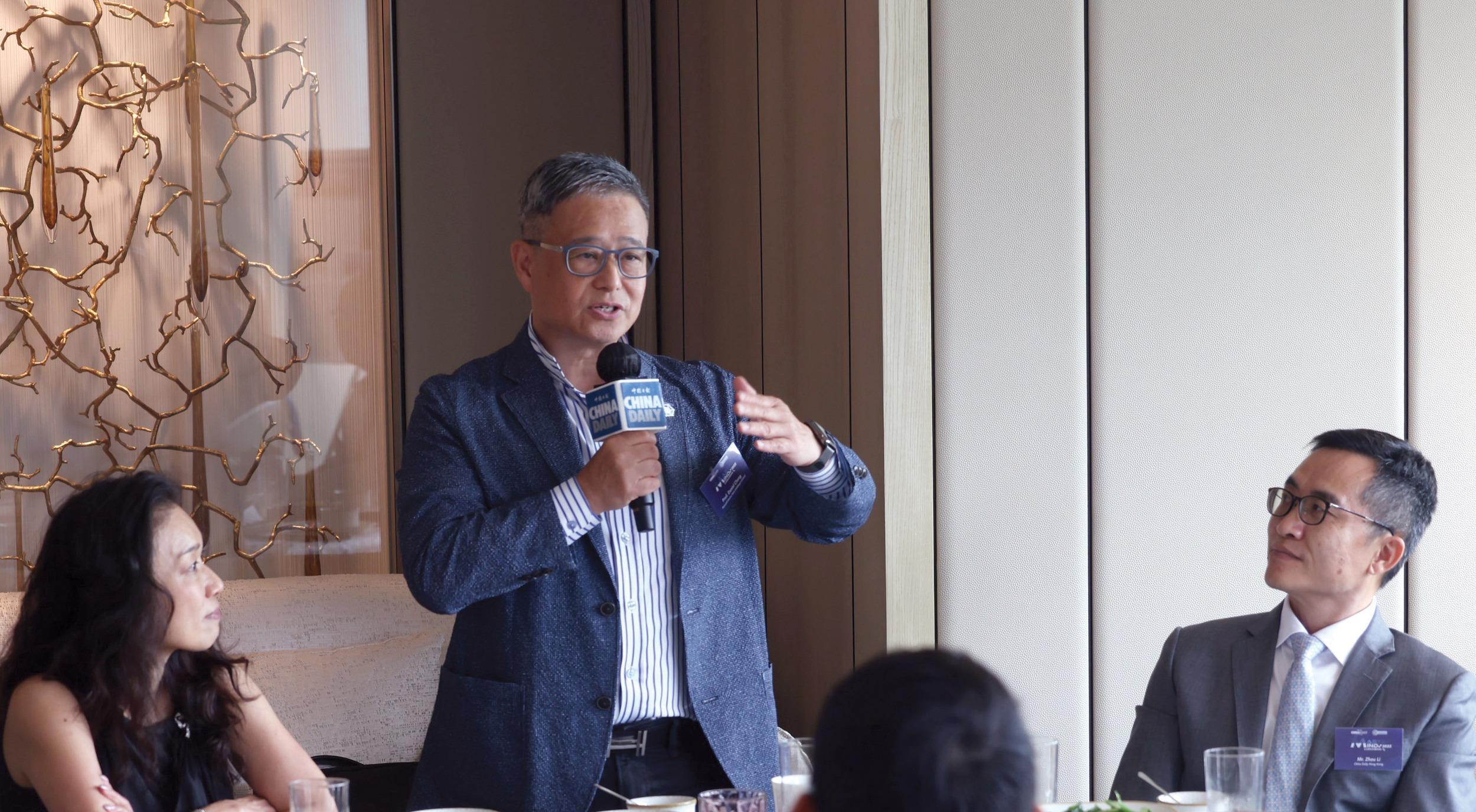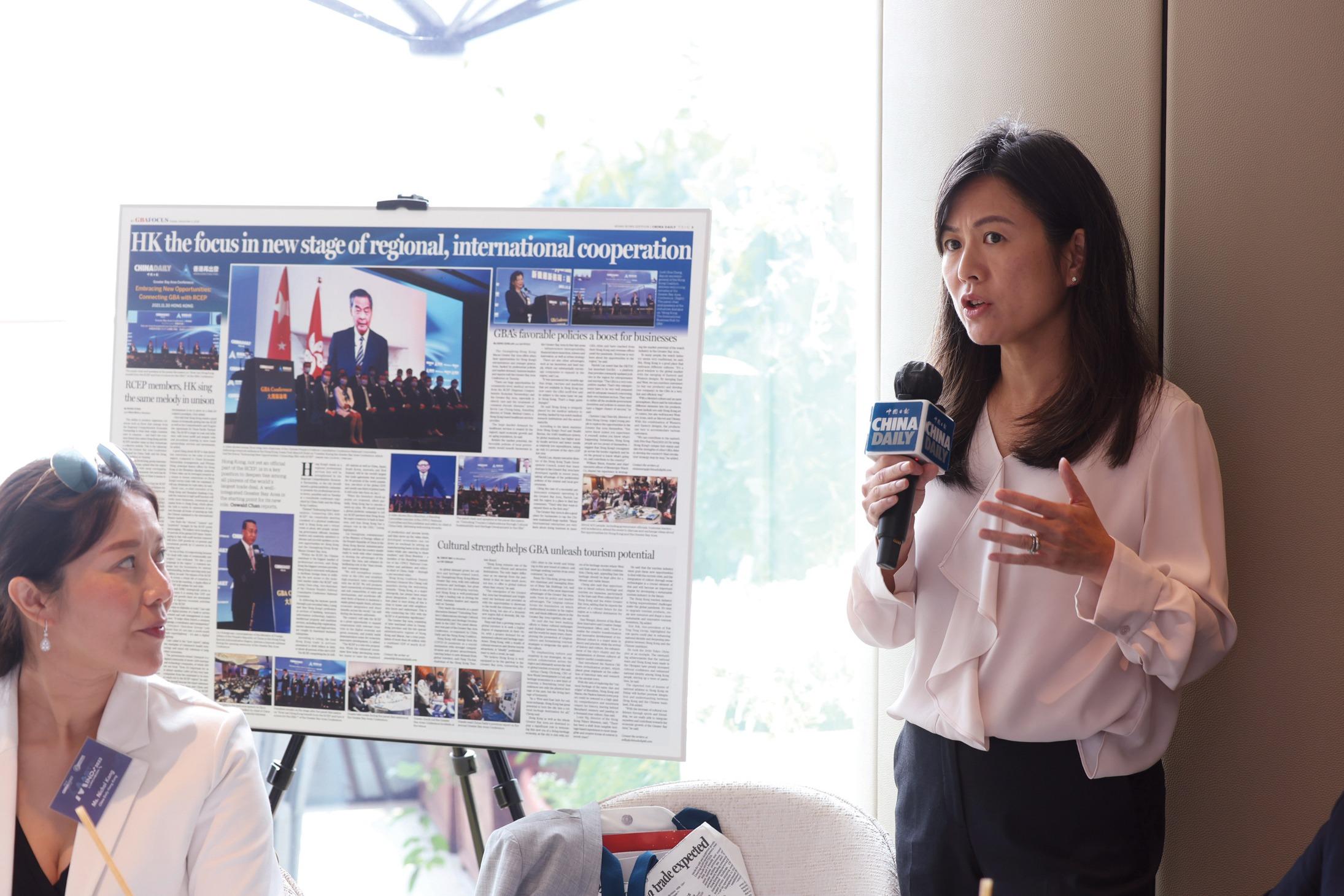ESG China Daily forum calls for improved rules, increased public awareness, enhanced corporate strategy
 Zhou Li (right), deputy editor-in-chief of China Daily Group and publisher and editor-in-chief of China Daily Asia Pacific, welcomed the participants to the event. (CALVIN NG / CHINA DAILY)
Zhou Li (right), deputy editor-in-chief of China Daily Group and publisher and editor-in-chief of China Daily Asia Pacific, welcomed the participants to the event. (CALVIN NG / CHINA DAILY)
With the upsurge in green practices and green bonds, it has become apparent that some firms have failed to act on reducing their greenhouse gas (GHG) emissions or have made misleading claims about the environmental benefits of their products or services to lure customers. The widespread use of such practices — known as “greenwashing” — must be addressed or they will impede progress in combating climate change and take a heavy toll on the investment environment.
Business leaders and experts at China Daily Hong Kong Edition’s Masterminds Gathering of Environment, Social, Governance and Greenwashing on May 30 proposed various solutions to mitigate greenwashing risks. These included raising public awareness, balancing regulation guidance and providing technological scrutiny.
The gathering commenced on a scorching-hot day, reflecting the urgency and significance of the topic at hand.
In the global green bond market, about one-third of corporate green bond issuers have had a poorer environmental performance following their initial green bond issuance, according to a report issued by the Hong Kong Monetary Authority in November.
Zhou Li, deputy editor-in-chief of China Daily Group and publisher and editor-in-chief of China Daily Asia Pacific, extended a warm welcome to all the experts, business insiders and investors who gathered to address the issue of greenwashing.
He said he hoped the event would help experts learn from each other and work together to find innovative measures to avoid greenwashing threats.
Daniel Cheng, managing director of Dunwell Enviro-Tech (Holdings) Ltd and the event moderator, said: “ESG is a common topic for discussion, but more attention must be paid to greenwashing.”
As president of the Hong Kong Environmental Industries Association, Cheng has been in the environmental sector for about 30 years. He regards the revolution as a journey and said that to mitigate greenwashing risks, one needs to start by educating and encouraging employees, family and friends.
A recent widely known greenwashing lawsuit involved the fast-fashion brand H&M, which was accused of making misleading claims about its products to capitalize on consumer green trends.
Bien Wong, board governor and honorary treasurer at Friends of the Earth (HK), said that over 60 percent of people in the US are willing to pay extra for sustainable products and products with sustainable packaging, so many brands claim their products are sustainable — but the public needs to know the reality behind such promotions.
“We need some incentives and penalties because everything has a price and everything needs a price,” he said.
PwC Asia Pacific ESG climate change partner Low Lit Ping said she believes some of the risks stem from a lack of understanding. “When we say ‘green product’, what does it mean?” she asked.
 Prominent experts and industry insiders in Hong Kong address the first Masterminds Gathering of Environment, Social, Governance and Greenwashing organized by China Daily Hong Kong Edition on May 30. (CALVIN NG / CHINA DAILY)
Prominent experts and industry insiders in Hong Kong address the first Masterminds Gathering of Environment, Social, Governance and Greenwashing organized by China Daily Hong Kong Edition on May 30. (CALVIN NG / CHINA DAILY)
The key to resolving such problems, she said, is to raise public awareness and to make sure that management teams, marketing teams and senior management teams understand what they mean when they make specific claims, as well as making sure those claims can be supported by evidence.
As an expert in the field, Low has reviewed ESG reports from many companies and noticed that most of them disclose only the positive aspects of their approach.
“There is nothing wrong with talking about challenges. Companies should be able to be transparent and say they are still facing challenges and not doing enough in certain areas, and how they are putting in more efforts to manage their risks,” she said.
Linda Ho, CEO of Green Council, a nonprofit environmental organization and certification body, emphasized the importance of onsite investigations to see if what the companies write in their ESG reports can be factually supported.
Vivi Hu, CEO and co-founder of ESG data and analytics fintech firm YoujiVest Technology, is a firm believer in the importance of technology and sustainability investment and said that technology and data analysis can help resolve transparency issues in ESG practices.
“Instead of relying on annual ESG reports only, our technology can cross-check their information with real-time performance,” she said.
Melanie Kwok, head of sustainability at Sino Group, said there are various ways that companies can strengthen their communications on sustainability, such as reporting on ESG and climate risks, setting sustainability goals, and adhering to the latest local and international ESG requirements.
“As a responsible corporation, Sino Group embraces sustainability through our daily operation. It is important to enhance the transparency of ESG data and disclosure, as well as to work closely with our like-minded partners to communicate ESG (information) in a reliable manner,” she said.
Head of ESG client strategy Asia Pacific at Invesco Alexander Chan said: “As ESG investments grow, the industry is balancing the risks of greenwashing and ‘greenhushing’ — cases where, even if investors are making green investments, they are cautious not to market them as such. Looking ahead, in addition to regulation, understanding an investor’s underlying processes will be key to evaluating greenwashing risks.”
With the increased regulatory scrutiny, everyone is becoming more cautious because of concerns about greenwashing risks, he said.
Chan said the challenge is to strike a balance between principle-based and prescriptive regulations so that one can minimize the risks of greenwashing and also avoid investing too much time and resources into complying with certain regulations.
Jack Lin, president of MioTech, one of Asia’s largest ESG data platforms, raised the issue of “methodology confusion”, as each organization and region has its own set of evaluation methodologies. Transparency empowered by big data technologies is the solution he proposes to solve this issue.
Professor Louis Cheng, a Dr S H Ho professor of banking and finance and director of the Research Centre for ESG at the Hang Seng University of Hong Kong, said firms should spend more time learning about what ESG information is relevant and what should be disclosed. “More importantly, they should not be afraid to say what they have achieved,” he said.
Carbon credits are another big issue of the day. Grace Hui, founder and CEO of Net Zero Asia Ltd, warned companies about the risks of jumping on the bandwagon of carbon credit investing because there are so many fraudulent projects now. She also suggested setting up a new organization to look into common credits.
Hui was a senior executive with Hong Kong Exchanges and Clearing Ltd (HKEX), where she spearheaded regular reviews of HKEX’s Environmental, Social and Governance Reporting Guide. In 2020, she initiated a new business for HKEX in green and sustainable finance, founding HKEX’s Sustainable and Green Exchange.
Joe Pan, co-founder of Carbon Neutral Club Hong Kong, challenged everyone on a personal level to offset their own carbon footprints and start by calculating their personal carbon footprint.
“Companies have consultancies lining up to help them to calculate their carbon footprint and will sell them carbon credits. But what we have seen over the years is that if we get to the individuals who care about their own carbon footprint, they will make better decisions at a corporate level,” Pan said.
Undersecretary-general of the Hong Kong Green Finance Association (HKGFA) Jenny Lee noted that greenwashing can sometimes occur unintentionally.
She said there are so many regulations that it can be difficult to make sense of them all and that people need training. Company executives should ensure some of the basic definitions are understood from the top down, and that the right types of controls and processes are in place, she said.
Jessica Chan, head of sustainability at MTR Corporation Ltd, said it is important to translate all kinds of guidance into internal requirements for all staff. “We have to do it together within the whole organization to move forward,” she said.
Chan recently formulated a long-term decarbonization road map and carbon reduction targets for MTR Corporation and developed a set of key performance indicators to gauge and drive the company’s performance in a wide range of sustainability aspects.
With an investment background, John Zhang, senior business development director of China Resources Environmental Protection Technology Ltd, shared his observation that professional investors know about greenwashing but the general public and decision-makers in other industries need to be educated or they will fall into the trap of greenwashing without knowing.
The Masterminds event was sponsored by Sino Group and The Fullerton Ocean Park Hotel Hong Kong.



